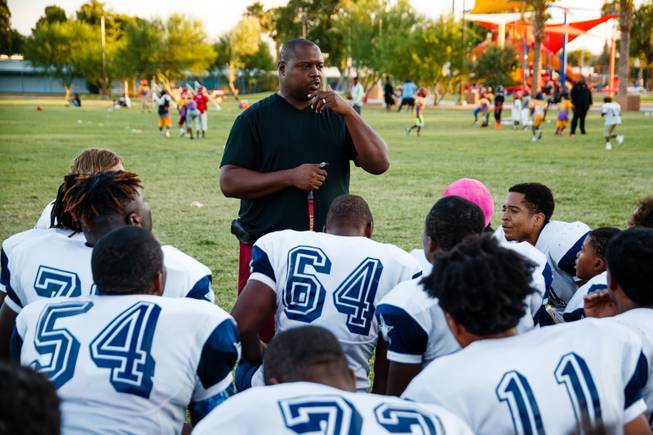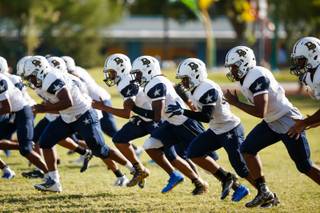
Democracy Prep Academy coach Keith Jones and his players practice huddle after practice at Kianga Isoke Palacio Park, Tuesday, Aug. 28, 2018. Practice is conducted at the nearby park because the school doesn’t have its own field.
Thursday, Sept. 20, 2018 | 2 a.m.
Coach Keith Jones arrived early for his team’s football practice and noticed a stranger asleep under a tree. A bottle of alcohol lay nearby. Jones attempted to wake the man but ultimately had to call police to get him to move.
Jones chuckles recounting the story, knowing these are the kinds of obstacles that make his quest to build the Democracy Prep high school football team into a competitive program such a challenge.
The public charter school on West Lake Mead Boulevard at J Street is the only program out of more than 40 in Southern Nevada without a field. Practices are conducted at the nearby Doolittle Community Center, and Rancho High School hosts Democracy’s home games.
Doolittle is about half the size of a regulation field, and the Democracy Prep Blue Knights often share the space with youth league teams. There are no field markings or goal posts, meaning it’s impossible to replicate game situations or practice the kicking game. Drills often bleed into those that pee-wee teams are running. There also are no blocking sleds for the linemen. What little gear the team does have, such as cones and blocking pads, gets walked across the street from storage on campus each day.
Jones is forced to look for potholes while he’s mapping out practice space. He missed one early in the year, and his best player rolled his ankle and had to miss time. “Anybody can’t do this job,” Jones says. “We’ve learned to appreciate things a lot more, because we don’t have some of the luxuries of other teams. We get the most out of our situation.”
Last year, Democracy played in Class 2A—for schools with an enrollment under 450 students—competing against local faith-based schools, which were also building their programs or schools from rural Nevada towns like Lincoln County. The Blue Knights finished with a 4-5 record.
This year, Democracy was elevated to Class 3A, the state’s second-highest classification, pitting it against the likes of Moapa Valley, an established power, and Cheyenne, a school with eight times the enrollment. Democracy Prep has 272 students—a figure doubled by the Nevada Interscholastic Activities Association’s formula because it’s a charter school.
But Jones doesn’t back down. He scheduled a game at Coronado, which has an enrollment of 3,200, to open the season. Democracy’s 25 players had never competed in front of that many fans or in a stadium of that size, so the game—win or lose—would provide a great memory. It would also help with development because, after all, some players had never been on a field with lines and hash marks.
Democracy surrendered a kickoff return for a touchdown to open the game, and as many suspected, was on the way to being defeated in blowout fashion. Then something magical happened—something so unexpected that Jones was left in awe. His players, many of whom won a 2A state championship last winter with the school’s basketball team, weren’t willing to roll over. They fought and clawed every play and won 12-10—one of the biggest upsets in recent prep sports memory. It was even more impressive considering six players left the game with leg cramps.
“The kids shocked the hell out of me,” Jones said after the game. “Just all heart. It was something else to see.”
Jones repeatedly tells players to forget about the things they don’t have—a practice field or other necessities—and to work only on the things they can control, such as their effort. They quickly learned that effort alone isn’t enough: Democracy lost its next three games, scoring just 27 points.
Players could use what they lack as an excuse for the defeats, and those gripes would seemed valid. But they don’t complain. “We know we have to keep pushing to get better,” senior Vanell Meeks says. “We make do with what we have.”
Winning is personal for Jones. He grew up in Twin Lakes, a historic neighborhood west of Democracy Prep at Vegas and Rancho drives, and attended Mabel Hoggard Elementary School. He walked most days after school to play sports at Doolittle, developing a passion for competing and representing his part of Las Vegas. Everyone knows each other in this part of town and is proud to call it home, Jones says.
Democracy Prep represents his neighborhood, which is too often characterized more by those drunkenly sleeping in the park than by the accomplishments of its children. The school—which selects students “regardless of race, economic situation, special education status, nationality, previous academic record or any other characteristic”— sends nearly all of its graduates on to college. Athletes are required to maintain a 2.3 grade-point average to compete in sports, compared with the 2.0 at most other schools.
It makes the win against Coronado, a school in an affluent part of town, so important. Democracy’s players weren’t held back by the stigma of where they come from or what they don’t have. They simply played better.
“Nobody saw that coming, because people doubted us,” says Kelly Jones, the coach’s son and one of Democracy’s best players. “It goes to show you that when you put your mind to something, you can accomplish anything.”

